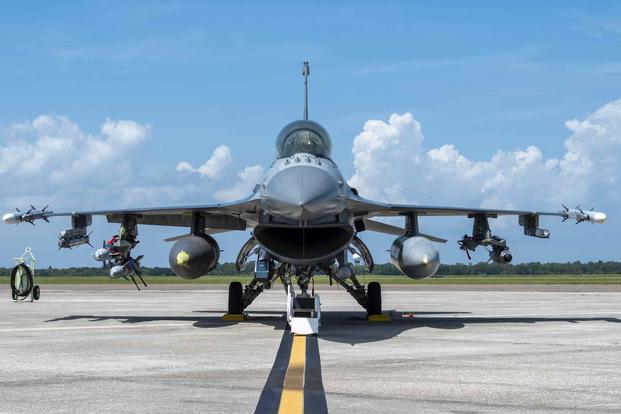Top Pentagon officials offered new details Thursday on a plan to train Ukrainian pilots to fly F-16 Fighting Falcon fighter jets, saying it will include at least six European nations, but it remained unclear what role the U.S. will play in the effort.
Secretary of Defense Lloyd Austin told reporters at a press conference that Denmark and the Netherlands have decided to take the lead in developing a plan to train the Ukrainians in the weeks ahead, while other European nations have pledged support.
"Norway, Belgium, Portugal and Poland have already offered to contribute to training and we expect more countries to join this important initiative," Austin said following a virtual meeting with defense leaders on security aid to Kyiv as it fights a Russian invasion launched last year.
Read Next: Air Force Gen. 'CQ' Brown Is Nominated as the Next Chairman of the Joint Chiefs
Austin said that the military leaders of both Denmark and the Netherlands recognize "that training is one thing, but to have capability, you need sustainment, you need maintenance, you need ordnance."
Gen. Mark Milley, the chairman of the Joint Chiefs of Staff, who also appeared at the press conference Thursday, said "10 F-16s is a billion dollars," pointing out the funding commitment of equipping Ukrainians with the jets.
"The sustainment costs another billion dollars, so you're talking about $2 billion for 10 aircraft," he said.
U.S. officials have yet to say where the actual aircraft or maintenance parts will come from, and all remarks to date have suggested the U.S. will not play a significant role.
Last Friday, a U.S. official said that it would be up to the countries that are participating in the training to decide "when to actually provide jets, how many we will provide, and who will provide them."
When asked Thursday whether Congress would support the extra funding needed to help the Ukrainians deploy the more advanced jets, Austin said that "it's an international effort."
"What I think you'll see our colleagues look to do is establish a fund so that other countries can contribute to this overall effort," Austin said. "Because of that, I think hopefully our Congress will be supportive."
Milley also joined his fellow military leaders at the Pentagon in emphasizing that the modern planes are not the key to changing the tide of a war that has already been going on for 456 days.
"There are no magic weapons -- an F-16 is not and neither is anything else," Milley said.
Pentagon officials said earlier this week that the jets will certainly not factor into the anticipated counteroffensive and offered no suggestion that Ukraine would even get the planes this year.
And while Miley, the military's top uniformed officer, pointedly said that "this war, militarily, is not going to be won by Russia," he was quick to add that it's not likely to end soon, either.
"The Ukrainian strategic objectives are to liberate all of Russian-occupied Ukraine. ... That might be achievable militarily, but probably not in the near term," Milley said.
"That means fighting is gonna continue, it's gonna be bloody, it's gonna be hard," he said.
-- Konstantin Toropin can be reached at konstantin.toropin@military.com. Follow him on Twitter @ktoropin.
Related: Ukraine F-16 Training Won't Aid Expected Counteroffensive, Pentagon Says












